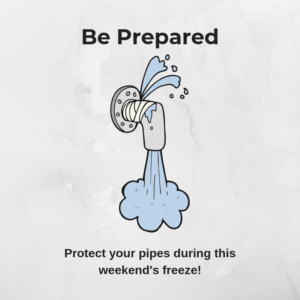
Unseasonably warm temperatures can provide a false sense of security when it comes to preparing for winter weather. Water has a unique property in that it expands as it freezes. This expansion puts tremendous pressure on whatever is containing it, including metal or plastic pipes. No matter the “strength” of a container, expanding water can cause pipes to break.
Pipes that freeze most frequently are those that are exposed to severe cold, like outdoor hose bibs, swimming pool supply lines, water sprinkler lines, and water supply pipes in unheated interior areas like basements and crawl spaces, attics, garages, or kitchen cabinets. Pipes that run against exterior walls with little or no insulation are also subject to freezing.
Take Preventive Steps during Winter
- Try to open kitchen and bathroom cabinet doors to allow warmer air to circulate around the plumbing. Be sure to move any harmful cleaners and household chemicals up out of the reach of children.
- Keep your thermostat set to the same temperature both during the day and at night. By temporarily suspending the use of lower nighttime temperatures, you may incur a higher heating bill, but you can prevent a much more costly repair job if pipes freeze and burst.
- If you are going away during cold weather, leave the heat on set to a temperature no lower than 55 degrees Fahrenheit.
How to Prevent Frozen Pipes
Before the onset of cold weather, prevent freezing of your water supply lines and pipes by following these recommendations:
Install pipe insulation: Use pipe sleeves or UL-listed heat tape, heat cable, or similar materials on exposed water pipes. These should be available at your local hardware store. Carefully wrap your pipes, with ends butted tightly and joints wrapped with tape. Always follow the manufacturer’s recommendations for installing and using these products. Even newspaper provides some degree of insulation and protection to exposed pipes – a 1/4″ of newspaper can provide significant protection in areas that usually do not have frequent or prolonged temperatures below freezing.
Drain the swimming pool: Always following your manufacturer’s or installer’s directions.
Shut down your sprinkler system: Turn off the automatic timer and bleed the system of water. Remove, drain, and store outdoors hoses. Be sure to close inside valves supplying outdoor hose bibs.
Check around the home: Look in areas where water supply lines are located and are in unheated areas. Be sure to check out the basement, crawl space, attic, garage, and under kitchen and bathroom cabinets. Both hot and cold water pipes in these areas should be insulated. A hot water supply line can freeze just as a cold water supply line can freeze if the water is not running through the pipe and the water temperature in the pipe is cold.
Seal off access doors, air vents, and cracks: Winter winds whistling through overlooked openings can quickly freeze exposed water pipes. Keep garage doors closed if there are water supply lines in the garage. Do not block furnace or water heater air vents used.
If Your Pipes Do Freeze
During severe cold weather, pipes can freeze even if you take precautions. If a pipe freezes, we advise that you contact a licensed plumber to help you thaw it out or make necessary repairs. If the pipe hasn’t burst, you can try to thaw it out with an electric heating pad, hair dryer, or towel soaked with hot water. Apply heat by slowly moving the heat source toward the coldest spot on the pipes. Never concentrate heat in one spot because cracking ice can shatter a pipe. Turn the faucet on and let it run until the pipe is thawed and water pressure returns to normal. Don’t use a blowtorch or other open-flame device. They are fire risks and a carbon monoxide exposure risk.
If a frozen pipe bursts and floods your home, turn the water off at the shut-off valve. Call a licensed plumber for help if you can’t find the broken pipes or if it’s inaccessible. Don’t turn the water back on until the pipe has been repaired. If you need an emergency water shutoff, please call our customer service department.
